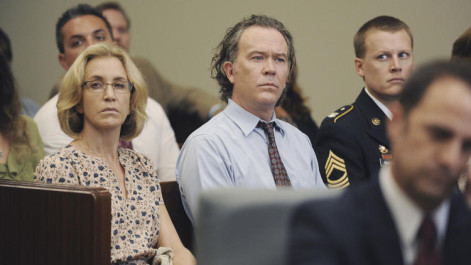It seems no one is clean in the ABC Network’s Thursday night serialized drama American Crime. (Warning: spoilers for the first two episodes abound beyond this paragraph.)
The show’s premise is that a seemingly random criminal act impacts a multitude of lives beyond the victims and their immediate families as they engage law enforcement, the criminal justice system, and each other after an attractive young couple is attacked in their home. It turns out that the crime may or may not have played out as a hit against a dealer of meth and weed. The husband dies, and the wife survives, but only on a ventilator. At first the cops believe that she was raped, but evidence suggests she willingly engaged more than one partner other than her allegedly drug-dealing husband shortly before the attack.
This isn’t easy to watch, and it’s not for the faint of heart. In fact, at points your writer winced to himself that American Crime might just be the most unrelentingly dismal television series of all time. The only characters who smile are a young couple removed light years from their respective modeling careers by the woman’s debilitating drug addiction and the young man’s eagerness to show his love by doing everything within his power to procure the drugs for her. We see the two in flashbacks of happier, healthier times, but also smiling at each other while viewers discern a predictably tragic denouement.
This story line is not as powerful (nor as ugly and inhumane) as the finale of Requiem for a Dream, but it’s as close to it as network prime time ever has approached. As the Romeo (Elvis Nalasco) is arraigned for murder, he and his Juliet (Caitlin Gera rd) whisper sweet nothings to each other from across the courtroom. Left to her own devices, it’s clear she’ll resort to further self-degradation to attain her fix until the once-upon-a-time her boyfriend returns from prison (if she lasts that long).
rd) whisper sweet nothings to each other from across the courtroom. Left to her own devices, it’s clear she’ll resort to further self-degradation to attain her fix until the once-upon-a-time her boyfriend returns from prison (if she lasts that long).
American Crime presents a world that was broken long before the premiere episode’s opening credits. Timothy Hutton and Felicity Huffman portray Russ and the appropriately named Barb, the divorced parents of the murdered son. In many ways, the couple’s dealings with each other resemble those between Hutton’s suicidal Conrad in Ordinary People (his film debut) and his distant and cold mother portrayed by Mary Tyler Moore. Barb not only channels Conrad’s mom but adds several layers of bitterness and racism in all her interactions, not least her conversations with an ex-husband who, years before in the throes of a gambling addiction, left Barb and their two sons to destitution and life in government-subsidized housing.
The casting decisions for these two characters were just right, as no one does puppy-dog regret and shame quite like Hutton, and no one is better than Huffman at portraying rage at a world perceived as conspiring against her at every turn.
As the parents of Barb’s and Russ’s daughter-in-law, Penelope Ann Miller and W. Earl Brown turn in, thus far, admirable performances, as they navigate the minefield of revelations about their daughter and war veteran son-in-law–not to mention Barb’s take-no-prisoners approach. This writer hopes the couple continues to seek and receive solace from their religious faith as new revelations about the crime surface.
I’m not holding out too much hope for that, however, as the show’s persistent bleakness and consistently gray photographic palette indicate nothing good is possible in the show’s universal microcosm of Modesto, California.
Another of the show’s preoccupations is racism. Not unsurprisingly for her character after the events in Ferguson, Missouri, and elsewhere, Barb questions whether her son’s murder isn’t considered a hate crime because he’s white. The Hispanic family on the perimeter of the American Crime story also grapples with whether the father (wonderfully portrayed by Benito Martinez) is ashamed enough of his own race that he would sell out himself and his family.
The writing and direction by American Crime creator John Ridley impress even as they depress. Ridley convincingly captures the dissociative elements of grief and fear by cutting away from characters as they speak their lines. He replaces the actors’ delivery with footage of them pacing, running their hands through their hair, and other physical actions indicating despair.
The words the characters speak deliver a greater narrative punch as viewers watch the actors physically display emotion without much movement of their mouths other than the grimace of a subdued sob. It’s a nifty technique, and it pays off handsomely in dramatic effect. The question remains whether audiences will sign on for the long haul for a program with such an overstated, dark perspective on today’s America.


Great characters great actors and great script but what’s up with all the lingering too-close close ups? Self indulgent dp. It sucks all the energy out of the scenes. Felicity Huffman wearing black contacts? She looks much loco!